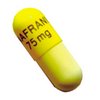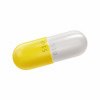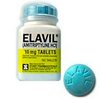 | Pristiq Active Ingredient: Desvenlafaxine Pristiq is used to treat major depressive disorder. |
INDICATIONS
Pristiq is used to treat major depressive disorder. Desvenlafaxine affects chemicals in the brain that may become unbalanced and cause depression.
INSTRUCTIONS
Take Pristiq exactly as prescribed by your doctor. Do not take this medicine in larger or smaller amounts or for longer than recommended.
You may take Pristiq with or without food. Take the medicine at the same time each day.
Do not crush, chew, or break an extended-release tablet. Swallow it whole.DOSAGE
Take Pristiq exactly as prescribed by your doctor.
Take the missed dose as soon as you remember. Skip the missed dose if it is almost time for your next scheduled dose. Do not take extra medicine to make up the missed dose.
STORAGE
Store at room temperature away from moisture and heat.
You should not use Pristiq if you are allergic to desvenlafaxine or venlafaxine (Effexor), or if you are being treated with linezolid or methylene blue injection.
Do not use Pristiq if you have taken an MAO inhibitor in the past 14 days.
To make sure Pristiq is safe for you, tell your doctor if you have:
bipolar disorder (manic depression);
liver or kidney disease;
heart disease, high blood pressure, high cholesterol, or a history of stroke;
glaucoma;
seizures or epilepsy;
a bleeding or blood clotting disorder;
low levels of sodium in your blood; or
if you are switching to Pristiq from another antidepressant.Some young people have thoughts about suicide when first taking an antidepressant. Your doctor will need to check your progress at regular visits while you are using Pristiq.
FDA pregnancy category C. Pristiq may cause problems in a newborn baby if the mother takes the medication late in pregnancy (during the third trimester). Tell your doctor if you are pregnant or plan to become pregnant during treatment.
Avoid drinking alcohol. It can increase certain side effects of Pristiq.
Get emergency medical help if you have any of these signs of an allergic reaction to Pristiq: skin rash or hives; difficulty breathing; swelling of your face, lips, tongue, or throat.
Report any new or worsening symptoms to your doctor, such as: mood or behavior changes, anxiety, panic attacks, trouble sleeping, or if you feel impulsive, irritable, agitated, hostile, aggressive, restless, hyperactive (mentally or physically), more depressed, or have thoughts about suicide or hurting yourself.
Call your doctor at once if you have:
seizure (convulsions);
easy bruising or bleeding (nosebleeds, bleeding gums), blood in your urine or stools, coughing up blood;
blurred vision, eye pain, or seeing halos around lights;
cough, chest tightness, trouble breathing;
high levels of serotonin in the body--agitation, hallucinations, fever, fast heart rate, overactive reflexes, nausea, vomiting, diarrhea, loss of coordination, fainting; or
low levels of sodium in the body--headache, confusion, slurred speech, severe weakness, vomiting, loss of coordination, feeling unsteady.
Common Pristiq side effects may include:
dizziness, drowsiness, anxiety;
increased sweating;
mild nausea, decreased appetite, constipation;
sleep problems (insomnia); or
decreased sex drive, impotence, or difficulty having an orgasm.
 AnafranilAnafranil is used for treating obsessive-compulsive disorder.as low as $0.36
AnafranilAnafranil is used for treating obsessive-compulsive disorder.as low as $0.36 SinequanSinequan is used for treating depression or anxiety in certain patients.as low as $0.3
SinequanSinequan is used for treating depression or anxiety in certain patients.as low as $0.3 VenlorVenlor is used for treating depression. It may also be used for other conditions as determined by your doctor.as low as $0.96
VenlorVenlor is used for treating depression. It may also be used for other conditions as determined by your doctor.as low as $0.96 ZoloftZoloft is used for treating depression or obsessive-compulsive disorder (OCD).as low as $0.31
ZoloftZoloft is used for treating depression or obsessive-compulsive disorder (OCD).as low as $0.31 ElavilElavil is used for the relief of symptoms of mental depression. It is also used to treat bulimia (an eating disorder), to control chronic pain, to prevent migraine headaches, and to treat a pathological weeping and laughing syndrome associated with multiple sclerosis.as low as $0.41
ElavilElavil is used for the relief of symptoms of mental depression. It is also used to treat bulimia (an eating disorder), to control chronic pain, to prevent migraine headaches, and to treat a pathological weeping and laughing syndrome associated with multiple sclerosis.as low as $0.41 WellbutrinWellbutrin (bupropion) is an antidepressant medication. It works in the brain to treat depression.as low as $1.96
WellbutrinWellbutrin (bupropion) is an antidepressant medication. It works in the brain to treat depression.as low as $1.96